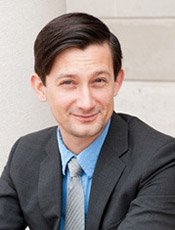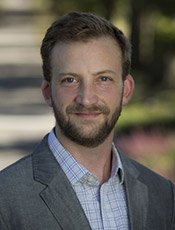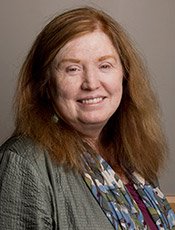Faculty Offer Post-Election Thoughts
Last week, President Valerie Smith joined Professor of History Allison Dorsey and Visiting Assistant Professor of Peace and Conflict Studies Sa’ed Atshan '06 in a packed LPAC Cinema to discuss diversity in the context of the presidential election. In an earlier message to the community, Smith encouraged students, faculty, and staff to “remember that civic engagement informed by critical reflection and analysis will move the country forward. Now, more than ever, we must continue the good and difficult work of creating a more inclusive, just, and compassionate community, both on our own campus and in the world.”
As conversations about the election’s impact continue across campus and beyond, below are some thoughts offered by faculty in a range of disciplines. History and political science are represented, to be sure, as are astronomy psychology, literature, and philosophy, among others.
Nathalie Anderson on having a voice | John Blanchar on keeping an open mind | Tim Burke on the definition of madness | David Cohen on the data | Christopher Fraga on the uncanny | Daniel Laurison '99 on no easy answers | Marjorie Murphy on seeing right | Ameet Soni on exercising empathy | Jamie Thomas on the big question | Krista Thomason on living with uncertainty | Dominic Tierney on the meaning of America | Rick Valelly '75 on suffrage politics
All I Have Is A Voice
Nathalie Anderson is the Alexander Griswold Cummins Professor of English Literature and Director of the Program in Creative Writing.
 For the past few days, I’ve been turning over in my mind a well-known line from Shakespeare’s sonnet 65, “How with this rage shall beauty hold a plea…?” Shakespeare is talking about the depredations of time, yet taken out of context, and I’m not the first reader to do so, we can so easily read it politically: in hateful times, what’s the use of art? Usually people interpret the line to mean something like, “Confronted with such rage, how can mere beauty stand a chance?” but I’m interested to think that it can also be (mis)understood as “While feeling such rage, how can beauty argue on its own behalf?” So, feeling so intensely, confronted with intensity, how do we go forward? Well, how do we not?
For the past few days, I’ve been turning over in my mind a well-known line from Shakespeare’s sonnet 65, “How with this rage shall beauty hold a plea…?” Shakespeare is talking about the depredations of time, yet taken out of context, and I’m not the first reader to do so, we can so easily read it politically: in hateful times, what’s the use of art? Usually people interpret the line to mean something like, “Confronted with such rage, how can mere beauty stand a chance?” but I’m interested to think that it can also be (mis)understood as “While feeling such rage, how can beauty argue on its own behalf?” So, feeling so intensely, confronted with intensity, how do we go forward? Well, how do we not?
Seamus Heaney, who came of age during the Troubles in Northern Ireland, offers these thoughts in his essay “The Government of the Tongue”: “In one sense the efficacy of poetry is nil – no lyric has ever stopped a tank. In another sense, it is unlimited. It is like the writing in the sand in the face of which accusers and accused are left speechless and renewed.”
Speechless and renewed.
The morning after the election, one of my students wrote of the solace she’d found in WH Auden’s “September 1, 1939” (the day Germany invaded Poland at the start of World War II), understanding it more fully now. “Those to whom evil is done / Do evil in return,” Auden writes, struggling to comprehend Hitler and his followers. “Out of the mirror they stare, / Imperialism’s face / And the international wrong,” he writes, acknowledging the ways our private selfishness enables public atrocity. “All I have is a voice,” he writes, “To undo the folded lie.”
All I have is a voice.
But a voice is not nothing, is not insignificant. Here are a few more among the many voices that spur, abash, challenge, comfort, and encourage me:
Audre Lorde (from “A Litany for Survival” in Black Unicorn):
and when we speak we are afraid
our words will not be heard
nor welcomed
but when we are silent
we are still afraid.
So it is better to speak
Kimiko Hahn (from “Mosquito and Ant,” from her book with that title, the words used to designate a script women devised in China to write to each other):
I want my letters to imitate
mosquitoes as they loop
around the earlobe with their noise:
the impossible task of slapping one
Robert Hayden (from “Voice in the Wilderness,” in his sequence “Words in the Mourning Time”):
Oh, master now love's instruments -
complex and not for the fearful,
simple and not for the foolish.
Master now love's instruments.
Wallace Stevens wrote of poetry in his essay “The Noble Rider and the Sound of Words” that “It is a violence from within that protects us from a violence without. It is the imagination pressing back against the pressure of reality.” Just so, we press on.
Keeping an Open Mind
Visiting Assistant Professor of Psychology John Blanchar studies the psychological underpinnings and consequences of ideology, judgment and decision making, and prejudice and stereotyping.

When Americans awoke on the morning of November 9, 2016, most were stunned to learn that Donald Trump had been elected the 45th President of the United States. Surprising news is usually met with a search for answers – why did so many people vote for Donald Trump? It is common and even natural for people to attribute the behavior of others as a reflection of simple, person-based qualities. The “other side” must have voted this way because they are “bad” people. However, human behavior is complex and shaped by many factors within us as well as in our environment; simple answers are unlikely to explain what happened and may instead escalate conflict. I think it is important that we keep an open mind in trying to understand the election and to talk to the “other side.” Diana Mutz, who spoke at Swarthmore earlier this fall, had it right; it is so easy to shut out and reject those we disagree with, but this accomplishes little. Open discourse is the best way forward.
The Definition of Madness
Professor of History Tim Burke is a widely cited cultural historian who writes about culture, politics, and academia on his blog Easily Distracted.
 Why am I getting so irritated with people earnestly posting about eliminating the electoral college, reducing voter suppression, encouraging more mail-in voting, and so on? Or saying that losing is a result of only one small variable (Comey’s meddling, successful voter suppression, etc.)?
Why am I getting so irritated with people earnestly posting about eliminating the electoral college, reducing voter suppression, encouraging more mail-in voting, and so on? Or saying that losing is a result of only one small variable (Comey’s meddling, successful voter suppression, etc.)?
I’m irritated because this is the opposite of organizing and fighting on. This is trying to find a simple, good, post-facto story that makes us feel better and that services our need to feel as if we are still in charge, still in power, and have some simple, useful thing that we can readily do that will change the situation the next time around. But it is the opposite of organizing at a time of extraordinary danger.
…
You cannot reform the voting system if you’re not in power. That’s basic. You cannot build a campaign that is 100 percent proof against a James Comey doing something unprofessional or inappropriate. That’s basic. If that’s what “organizing” means to you, you’re just lighting matches to find gas leaks. The precondition to reforming voting is winning elections without having voting reforms. The Republicans understood that back in the 1990s; that, having won due to [Bill] Clinton’s mid-term unpopularity, they could execute a plan that would make the terms of elections more favorable to them. They’ve gotten more desperate and transparent about that over the years, but they never forgot: you only get to to do this when you have a significant legislative majority, executive power, and some judicial support. (They’ve struggled sometimes with the latter.)
If you’re requiring campaigns that win only if they avoid a single misstep, not a single unpredictable tactical move by either an enemy or by an incompetent bureaucrat, that are less horse races than Swiss-built watches, you’re lighting matches to find gas leaks. You cannot have short, civil, intensely rule-constrained elections (which a few countries actually have!) without first winning elections in the system and culture you actually have.
It's the Data
Professor of Astronomy David Cohen
 As a scientist, I was extremely concerned throughout the campaign, and not just at Trump and other Republicans' attacks on science and scientists (calling climate change a "hoax perpetrated by the Chinese," for example). But more generally, I was concerned by the lack of respect and, indeed, the scorn, for reality. A healthy respect for reality and fact-based rationality underlies not just science, but all learning and knowledge, and is fundamental to the proper functioning of our society's institutions. All these things are under the greatest threat we've seen since at least WW II.
As a scientist, I was extremely concerned throughout the campaign, and not just at Trump and other Republicans' attacks on science and scientists (calling climate change a "hoax perpetrated by the Chinese," for example). But more generally, I was concerned by the lack of respect and, indeed, the scorn, for reality. A healthy respect for reality and fact-based rationality underlies not just science, but all learning and knowledge, and is fundamental to the proper functioning of our society's institutions. All these things are under the greatest threat we've seen since at least WW II.
One important lesson of science is the need to pay attention to data. We will see in the coming months attempts by Trump and his apologists to deny the things he said and promised in the campaign, that he wasn't serious; it was only talk deployed to win an election. The most vital things people of good will can do as we try to prevent the slide into tyranny and autocracy are to help each other and to keep reminding ourselves, each other, and other people — including Trump supporters — that the horrific things Trump said, did, and promised are for real. We have the data and we can't ignore it. For example, Trump promised to bar entire religions from the country, to use the police to punish entire communities of ethnic and religious minorities, and to punish women who have abortions.
As Maya Angelou said, "When someone shows you who they are, believe them the first time."
The Uncanny
Assistant Professor of Anthropology Christopher Fraga teaches an Honors seminar on anthropology and capitalism.
 Last Tuesday night I was overcome by an emotion I don’t remember ever having felt quite so acutely before: a particular kind of dread that Freud identified as “the uncanny,” a feeling provoked by “something which is secretly familiar, which has undergone repression and then returned from it.” Over the past week, I think many of us have seen how the uncanny can mutate into a variety of emotional states: some of us have been overcome with anxiety, depression, or outright despondency; others have been filled with outrage.
Last Tuesday night I was overcome by an emotion I don’t remember ever having felt quite so acutely before: a particular kind of dread that Freud identified as “the uncanny,” a feeling provoked by “something which is secretly familiar, which has undergone repression and then returned from it.” Over the past week, I think many of us have seen how the uncanny can mutate into a variety of emotional states: some of us have been overcome with anxiety, depression, or outright despondency; others have been filled with outrage.
If we’re careful, I think all of these feelings can become important and productive steps toward turning our fear, anger, and disappointment into fuel for organized political action. And I think we would do well to start by drawing some lessons from that initial feeling of the uncanny. If we’re to have any hope of intervening in the periodic oscillation in the balance of power between the two major parties in this country, and thus of driving our future policy choices more consistently and more cumulatively in a just, equitable, and inclusive direction, I think we need to be wary of externalizing our fears and demonizing our political opponents. With that in mind, however, it is imperative that we take the full measure of what Trump's election is telling us about the presence of a desire, among some subset of the electorate, for a leader who has so openly espoused an authoritarian disregard for democratic principles.
No Easy Answers
Daniel Laurison '99, assistant professor of sociology, is teaching a class this semester on the 2016 presidential election.
 Trying to understand the election? I have two pieces of advice:
Trying to understand the election? I have two pieces of advice:
1. Remember what result you’re explaining. Donald Trump won the Electoral College, but of adult citizens eligible to vote, it looks like around 27 percent voted for Hillary Clinton, 26.5 percent for Trump, 3.5 percent for someone else, and about 43 percent stayed home.
2. Be very suspicious of single-factor explanations; if someone says “If only this one group had done something different, the result would have been different,” think about all the different groups that could fit into that sentence: third-party voters, women supporting Trump, non-voters, whites without college degrees. With a result that close, any number of very small differences could have led to a different result, and anyone can find some data to support their favorite single-factor explanation.
Seeing Right
Marjorie Murphy, James C. Hormel Professor in Social Justice, teaches courses on U.S. history, especially in the fields of working-class history, women and gender, and foreign affairs.

"With malice toward none, with charity for all, with firmness in the right as God gives us to see the right, let us strive on to finish the work we are in...” Abraham Lincoln warned in 1865. So let us see right, and refuse to quit the work we are in, finish the work of what is right, not with malice, but firmness in the right of what we seek. Some worked for eight years to get to the victory of our last election; we might have just four years, so let us strive on to finish and refuse to stop. When we register voters for the next election in May, and we refuse to be silent in the face of injustice, then we are finishing the work for what is right. There is power in refusal, power in the numbers behind that refusal, and power within ourselves to recognize that refusal. It’s a new day, get started.
Exercising Empathy
Assistant Professor of Computer Science Ameet Soni

In this time, you may find many friends in pain, and possibly tears. Please don't tell them, "It'll be okay" or less, charitably, "Get over it". Maybe it will be okay, maybe it won't. But for many people of color (and our allies and friends) Tuesday's results hurt. Really bad. Many feel abandoned by their country, that they don't belong. Others are filled with anxiety because they don't know what will happen to their community and loved ones. So I urge you to instead exercise empathy; do not discount the fears of anyone you meet, regardless of their background and views. A simple, "I don't know what's going to happen, but I promise to have your back" is a start. Reaching out and trying to understand our fear would be even better. For those of us who feel isolated and disconnected, community is the only thing that can provide comfort.
The Big Question
Assistant Professor of Linguistics Jamie Thomas is a linguistic anthropologist with applied specialties in human interaction, learning, and communication. She also runs the #languagestory blog.

Years ago, it was Sojourner Truth, born to enslavement in New York state, who got up on that same stage in 1851 to fight to be seen, heard, and recognized as a woman, in front of other women, White women, and men alike. It is said that Sojourner stood up at the conference in Akron, Ohio, that year, amid jeers of "Darkey" and "Don't let her speak, she'll ruin us!" The struggle for recognition and humanity in the U.S. has always been intersectional for Black women. To this point, Sojourner famously said in her remarks: "I am a woman's rights."
Seeing our electorate literally cleaved in two puts everything out in the open. No one can deny that our sociocultural polarization creates barriers to our understanding of one another, and our ability to form effective political coalitions to challenge the status quo. As I look to 2018 and 2020, I know that we're on the cusp of tremendous change. The big question, now, is what will you do the day after tomorrow? How will you change? How will you work to meet and learn from people you don't already know?
Beginning the important work of self-reflective growth, learning, and action is how our country has come this far, and it is how we will continue to move forward in dismantling structural injustice and normalized bigotry. It was never our choice to connect students with community partners at Serenity House in North Philadelphia to have a conversation about neighborhood activism and identity, it was our responsibility. It's not my choice to call out bigotry, it's my responsibility. There are many ways to be a leader, but self-reflective change may be the most important.
Living with Uncertainty
Assistant Professor of Philosophy Krista Thomason's specialties include ethics, moral psychology, and social/political philosophy.

The refrain I keep coming back to is this: think, don't act. This sounds backwards, especially in times like these because it's tempting to think that immediate action is required. After events like this we are very tempted to accept simple explanations and quick solutions because we're looking for stability. We jump into action because need to feel like we're doing something so that we don't feel helpless. The need for stability is understandable, but it can't take the place of good judgment. Not wanting to feel helpless is also understandable, but doing something can't take the place of doing the right thing. Resisting easy answers and quick fixes takes courage because it means living a little longer with uncertainty and helplessness. People often become suspicious of thought because it can look like dithering, but thought isn't a sign of cowardice. It's a sign of strength.
The Meaning of America
Associate Professor of Political Science Dominic Tierney is a senior fellow at the Foreign Policy Research Institute. This week, he discussed Donald Trump and foreign policy on WHYY's RadioTimes.

In challenging times, the best response is to adopt the Swarthmore values of humility, generosity, and resistance.
The first response should be humility. If expectations were so wide of the mark, then progressive assumptions were wrong. The left must consider why the white working class is so estranged from the Democratic Party. Racism and xenophobia is surely part of the answer, but focusing solely on these dynamics can de-legitimize Republican voters, simplify a complex picture, and narrow the debate.
It’s also a moment for generosity toward the opposing side. Progressives should follow Clinton’s advice and give Trump a chance to lead. To immediately deny Trump’s legitimacy will further cement the partisan chasm and ensure that future presidents will be despised by half the electorate. Democrats can look for areas of cooperation with Trump like infrastructure spending. His apparent flexibility on Obamacare is a hopeful sign. Indeed, there may be more room for compromise with Trump than with a traditional movement conservative like Ted Cruz. Democrats can offer Trump the chance to be a genuine uniting president: an outsider who is not locked into the partisan battle and can work with both parties. Trump’s ego might find this vision appealing. And having come second in the popular vote, been rejected by many senior Republicans, facing a divided country, and with zero government experience—Trump might want all the friends he can get.
Wishful thinking, many will say. But it’s beyond the water’s edge where there’s the greatest uncertainty. Trump threatens the global liberal order built by the United States since World War II, based on international institutions, alliances, and reduced barriers to trade. This order has delivered decades of peace between countries (although it’s been less successful at stopping wars within countries like Syria).
If Trump chooses to wage war on progressivism, there’s no choice but to resist, by building a mass movement to protect essential values. Progressives should avoid lurching to the left and irrelevance. Instead, they should fight Trump by reaching out to mainstream opinion, including the white working class, and by wrapping themselves in the flag. The contest is nothing less than a fight about the meaning of America.
Suffrage Politics
Rick Valelly '75, Claude C. Smith ’14 Professor of Political Science, is the author of the award-winning The Two Reconstructions: The Struggle for Black Enfranchisement.

The 2016 presidential election is the first presidential election since Congress enacted the Voting Rights Act (VRA) in 1965 to be conducted with a sharp drop in the number of federal elections observers deployed by the Department of Justice and with a host of election law changes, such as a reduction in polling stations and in similar ballot access changes. The Supreme Court created this new context when it invalidated Section 4 of the 2006 renewal of the Voting Rights Acts in its 2013, 5-4 decision, Shelby County v. Holder. Section 4 specified which jurisdictions are covered by the Voting Rights Act for special administrative treatment under Section 5, the so-called "preclearance" section. By invalidating Section 4, the Shelby decision opened the gates for changes that previously would not have survived preclearance by the Voting Rights Section of the Civil Rights Division of the Department of Justice.
Most of the previously covered states have since enacted restrictive provisions relative to the baseline of ballot access that existed before Shelby, and have also faced judicial review under Section 2 of the Voting Rights Act, somewhat mitigating the impact of Shelby. Also, some states that were never covered by Section 4, such as Wisconsin, have enacted clearly restrictive provisions. But the change in Wisconsin has nothing to do with Shelby; it was legal when the Help America Vote Act of 2002 survived Court review in 2008. So far, Wisconsin's election law changes, which can be challenged under Section 2 of the Voting Rights Act, have survived review. But that may change.
The bottom line, of course, is that many have accordingly wondered whether voter suppression rigged the 2016 election in favor of the Republican candidate, Donald Trump. Prima facie the answer is mostly no. Hillary Clinton won the popular vote, after all. To be sure, she lost Wisconsin and North Carolina. And Wisconsin saw a significant drop in turnout. But turnout in North Carolina went up, as it did in other states previously covered by the VRA (North Carolina, incidentally, was covered only in part by the VRA.) The only Section 4-covered state that saw a significant drop in turnout is Mississippi, where the state did sharply reduce the number of polling stations, something it could never have done before Shelby. All other VRA covered states saw either little to no change or an actual increase in turnout.
Which brings us back to Wisconsin. Clinton might have won that state if she had worked harder there. So as of now, we don't know whether election law or a campaign mistake made the difference there.
Is voting getting harder in the U.S.? In some places the answer is clearly yes. But the increased difficulty in some jurisdictions did not award the election to Trump. Whether we'll be able to say the same thing in 2020, assuming Trump runs for re-election, is another matter altogether. What I call ‘suffrage politics’ is now a major feature of American politics, as it has been since the early 19th century — sometimes in a good direction, sometimes in a bad direction. With luck, not much will change on the ground over the next four years.


